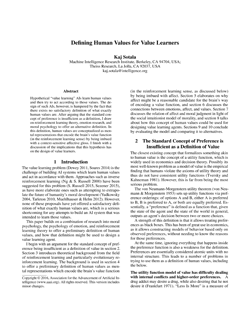 MIRI Research Associate Kaj Sotala recently presented a new paper, “Defining Human Values for Value Learners,” at the AAAI-16 AI, Society and Ethics workshop.
MIRI Research Associate Kaj Sotala recently presented a new paper, “Defining Human Values for Value Learners,” at the AAAI-16 AI, Society and Ethics workshop.
The abstract reads:
Hypothetical “value learning” AIs learn human values and then try to act according to those values. The design of such AIs, however, is hampered by the fact that there exists no satisfactory definition of what exactly human values are. After arguing that the standard concept of preference is insufficient as a definition, I draw on reinforcement learning theory, emotion research, and moral psychology to offer an alternative definition. In this definition, human values are conceptualized as mental representations that encode the brain’s value function (in the reinforcement learning sense) by being imbued with a context-sensitive affective gloss. I finish with a discussion of the implications that this hypothesis has on the design of value learners.
Economic treatments of agency standardly assume that preferences encode some consistent ordering over world-states revealed in agents’ choices. Real-world preferences, however, have structure that is not always captured in economic models. A person can have conflicting preferences about whether to study for an exam, for example, and the choice they end up making may depend on complex, context-sensitive psychological dynamics, rather than on a simple comparison of two numbers representing how much one wants to study or not study.
Sotala argues that our preferences are better understood in terms of evolutionary theory and reinforcement learning. Humans evolved to pursue activities that are likely to lead to certain outcomes — outcomes that tended to improve our ancestors’ fitness. We prefer those outcomes, even if they no longer actually maximize fitness; and we also prefer events that we have learned tend to produce such outcomes.
Affect and emotion, on Sotala’s account, psychologically mediate our preferences. We enjoy and desire states that are highly rewarding in our evolved reward function. Over time, we also learn to enjoy and desire states that seem likely to lead to high-reward states. On this view, our preferences function to group together events that lead on expectation to similarly rewarding outcomes for similar reasons; and over our lifetimes we come to inherently value states that lead to high reward, instead of just valuing such states instrumentally. Rather than directly mapping onto our rewards, our preferences map onto our expectation of rewards.
Sotala proposes that value learning systems informed by this model of human psychology could more reliably reconstruct human values. On this model, for example, we can expect human preferences to change as we find new ways to move toward high-reward states. New experiences can change which states my emotions categorize as “likely to lead to reward,” and they can thereby modify which states I enjoy and desire. Value learning systems that take these facts about humans’ psychological dynamics into account may be better equipped to take our likely future preferences into account, rather than optimizing for our current preferences alone.